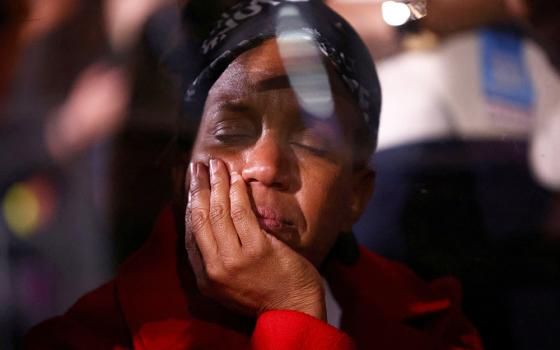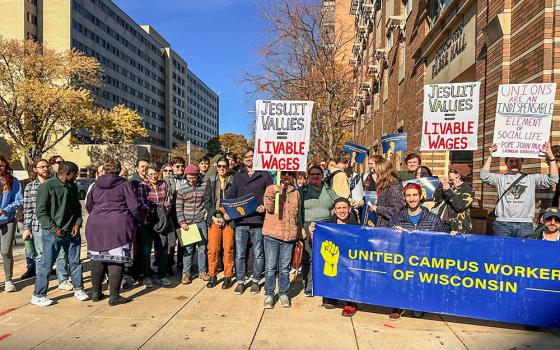Today is the first Tuesday after the first Monday in November which means it is election day. In Kentucky, voters will be selecting a new governor. In Virginia, control of the state legislature is up for grabs. In my home town in Connecticut, my Dad tells me the most heated contest if for tax collector. (I am sure there is a funny biblical joke to be made about that, but I haven’t found it yet.) Mostly, today, my thoughts are on what this day will look like one year from now.
Democracy is rarely pretty. Last night, CNN had a special documentary on the 2000 Bush v. Gore election and, specifically, the post-election nightmare in Florida. This brought back strong memories. I had walked several precincts in Harrisburg, Pennsylvania that day but got back to Washington in time to attend a party of fellow Gore supporters. The networks called Florida and Pennsylvania for Gore early in the evening, then pulled back Florida, then called it for Bush, then deemed it too close to call. (How many of us came to learn the names of many Florida counties that night!) I remember the sinking feeling in my stomach some days later when Gore’s legal team announced they would only be asking for a recount in four heavily Democratic counties, ceding the high moral ground they had claimed. I remember being at dinner at 1789 to celebrate a friend’s birthday the night the Florida Supreme Court ordered a statewide recount. The husband of the woman whose birthday it was worked for Gore, arrived late, but brought copies of the decision for everyone at the table. Then, the sinking feeling came back when the U.S. Supreme Court ordered the counting stopped and, a couple of days later, ruled that Bush had won.
Our nation’s democracy survived the Florida 2000 debacle. It was enough of a fluke, and seemed unlikely to be repeated, so the country moved on. I wonder what would have happened if, say, the 2012 election had ended in a similar mire? There are pathologies in our democracy today that either were not present in 2000 or which were present but hidden back then, most obviously a racial tension and animus that is deeply disturbing. When you hear Donald Trump pledge to “make America great again,” the premise is that America was great before but has lost its greatness. Certainly, I think our growing income inequality is a loss, but I do not think that is the only thing that most people who are cheering Trump are thinking: Some of them cheer his nativist bile because they are racists, and they do not like brown people entering the country and they really do not like having a black man lead the country. This undercurrent of racism was obvious in some of Sarah Palin’s rants in 2008. It is obvious today too.
The Democrats are better, but not by much. Last week, in my links, I called attention to an article by Stephen Schneck, director of the Institute for Policy Research & Catholic Studies where I am a visiting fellow. Schneck wrote about what he diagnosed as the Democrats’ central problem: They have changed from a party that focused primarily on the concerns of working people to a party focused on a set of cultural causes with strong activist, donor support among the highly educated upper middle class. As late as 2004, the GOP wanted same sex marriage on the ballot, because that issue still worked for them in the culture wars and, therefore, the political fight. Now, Democrats argue with one another about who was the first to support same sex marriage. During the only Democratic presidential debate this year, the question was asked, “Do black lives matter or do all lives matter?” Sen. Bernie Sanders gave a reasonably decent response, but the question is offensive and wrong: Unless all lives matter, black lives do not matter, and unless black lives matter, no lives matter. Certainly, the Rev. Martin Luther King Jr. would have challenged the question, not answered it. And, no one would ask a really interesting question in a Democratic debate: Do unborn black lives matter?
There are deeper pathologies that both parties share. Campaigns have become an industry, with well-paid media consultants and direct mail consultants and pollsters and professional field organizers. Candidates are expected to raise money and serve as a mouthpiece for policies devised by the professional campaign staffers, most especially the pollsters. No candidate is encouraged to speak her mind without first running a focus group. No candidate is allowed to address an issue that does not poll well. This had disastrous consequences for the Democrats in 2010 when they declined to talk about the Affordable Care Act and Republicans talked about it a lot, so voters had only one side of the story, the negative side, and reacted accordingly. I have mentioned before the experience of working on General Wesley Clark’s presidential bid. The pollster told us that Democratic primary voters were so anti-war, we needed to stop calling the candidate “General Clark.” Henceforth, he would be Wes. We printed campaign literature that never mentioned he was a four-star general who had been Supreme Allied Commander. It was going to be “Wes Clark, tax expert.” It was insane. The only rationale for Clark’s candidacy was that he was a four-star general who had opposed the Iraq War and, like all modern generals, he had experience running a large, cumbersome bureaucracy, and running it well.
The campaign professionals have produced the kind of lame, milquetoast politics that has now occasioned a backlash. Trump and Dr. Ben Carson garner more than fifty percent of the GOP primary votes at the moment, a testimony to that backlash. The commentariat can attribute the rise of Trump and Carson to the benighted attitudes of many Americans, and there is something to that when large percentages of Americans believe that President Obama was not born in the U.S. or that he is not a Christian. But, the commentariat, because it shares many of the socio-economic and educational blinders that plague the Democrats, have had trouble recognizing that the crowds at the Trump rallies are registering a disgust our contemporary politics has earned. I recoil when that disgust is mixed with nativist racism, but the disgust is not misplaced.
Yesterday, Cardinal Oscar Rodriguez spoke at Georgetown’s Law School about Laudato Si’. The event was organized by John Carr’s Initiative on Catholic Social Thought in Public Life. The cardinal spoke about the need for all politicians, of every nation and every party, to work for the common good of protecting our common home. He is undoubtedly right. The need to take action on environmental issues is here and now, but I wonder if the people who run campaigns will find a focus group to support such action. Can we entice a politician to support action to save the planet even if it doesn’t poll well?
Do not despair. History is a funny thing. Listening to Cardinal Rodriguez state the obvious, I was thinking, “250 years ago, the Church was accused of obscurantism, and not without some justification. Even sixty years ago, Paul Blanshard’s anti-Catholic diatribes were best-sellers. Now, the voice of sanity is the Church’s voice.” Democracy has been and is being abused. But, events may yet conspire to invite better angels, better policies, better politics. This day next year, and the twelve intervening months, will be a kind of proving ground for our democracy. Will secular politics become the locus of obscurantism in our time?




